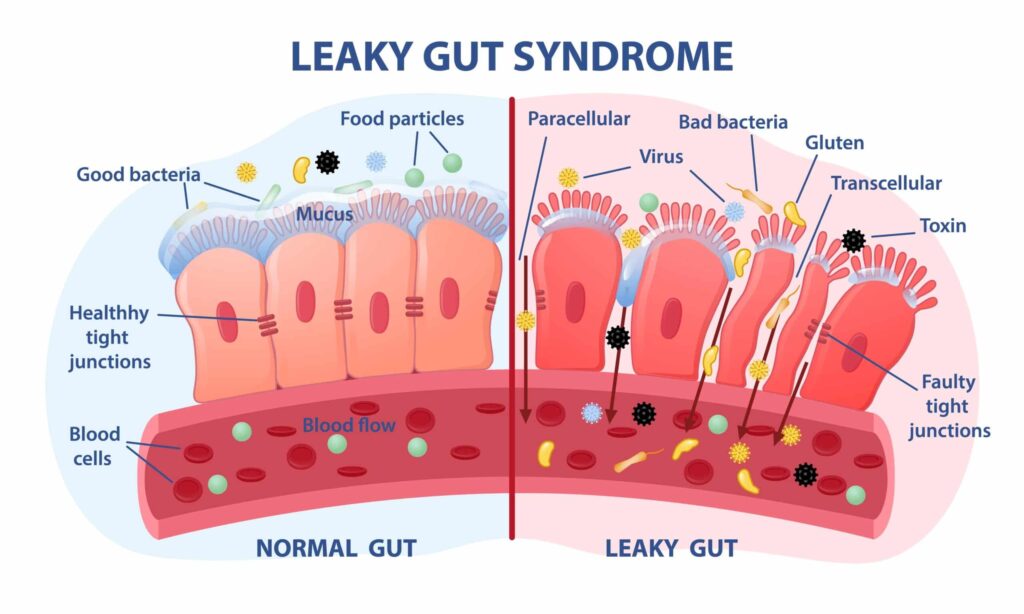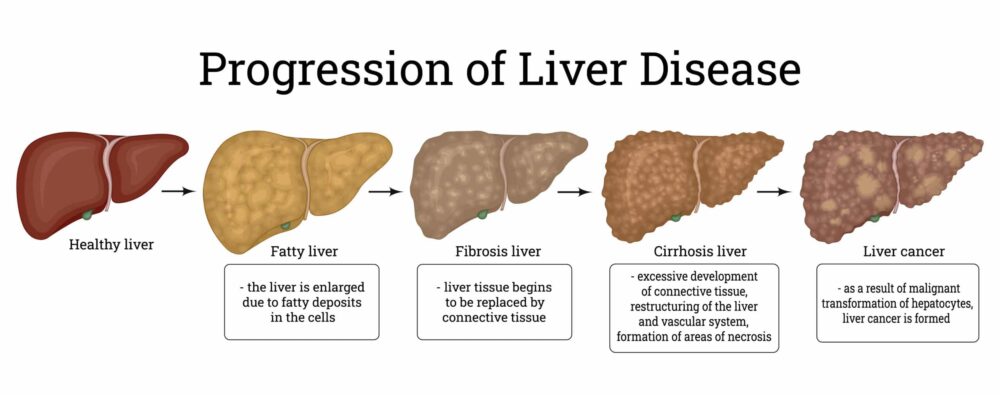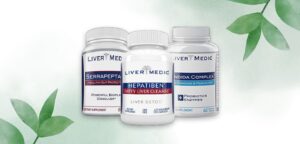
More and more people are talking about gut health. This topic has gained popularity as digestive problems become more common.
The term “leaky gut” has also gained attention over time. It describes a condition that affects the gaps in the intestinal walls, causing them to loosen.
Also known as increased intestinal permeability, this condition has been associated with other diseases, including type 1 diabetes. However, leaky gut syndrome has not been recognized as a medical diagnosis even though many factors can affect gut health and result in other digestive diseases.
The gut is at the center of people’s health and plays a key role in the immune system’s functioning. Also, it’s the place where the body produces the most serotonin and breaks down nutrients to feed other systems. Therefore, taking care of its health and preventing digestive disorders is crucial.
Here’s more information on how leaky gut, fatty liver, and other digestive diseases affect the US population, common symptoms to watch out for, and potential treatment options to improve overall health.
The Size of the Problem – How Prevalent Are Digestive Disorders?
According to the National Institute of Diabetes and Digestive and Kidney Diseases, between 60 and 70 million people in the US suffer from gastrointestinal (GI) diseases. Unfortunately, these conditions disrupt their lives, cause disabilities, and increase the death rate.
“between 60 and 70 million people in the US suffer from gastrointestinal (GI) diseases”
In addition, the latest statistics from the Centers for Disease Control and Prevention show that the first diagnosis for at least 8 million people who visit emergency rooms is a disease related to the digestive system.
Reports from the Pan American Health Organization (PAHO) also showed alarming figures related to digestive issues. These diseases caused 24.41 deaths per 100,000 people in 2019.
The American Gastroenterological Association (AGA) also released new data on digestive diseases, revealing that around 40% of Americans have experienced uncomfortable bowel symptoms that affect their routine activities.
However, even though these figures show that the country is facing a worrying epidemic of digestive diseases, patients don’t receive a proper diagnosis until the condition worsens or becomes severe.
Most people wait until they develop severe symptoms to discuss a possible digestive issue with their healthcare providers. In addition, many don’t consider the root cause when treating these diseases.
Demographic Impact of Digestive Disorders
Digestive disorders can affect everyone. The Pan American Health Organization’s regionwide reports showed they caused 375,170 deaths in 2019. The figure included 215,168 deaths in men and 160,002 fatalities in women.
“375,170 deaths in 2019 from digestive disorders. It’s an epidemic”
Also, the crude rate was 37.2 deaths per 100,000 people, including 43.3 fatalities per 100,000 men and 31.3 per 100,000 women.
In addition, the age-standardized death rate was 36.6 fatalities per 100,000 men and 21.1 deaths per 100,000 women.
Understanding What Leaky Gut Syndrome Is
Numbers don’t lie. The United States faces a growing problem, and digestive disorders have become an epidemic that affects a large part of the population. Therefore, it’s important to take care of gut health.
Unfortunately, many people develop leaky gut syndrome. As mentioned, it’s a hypothetical condition that affects intestinal permeability.
Before delving into this condition, it’s also crucial to understand how the digestive system works.
What People Should Know About the Digestive System
Essentially, the digestive system houses many organs, which work together to fulfill several functions. They break down food to absorb nutrients, help people stay hydrated after consuming water, and get rid of what the body doesn’t need.
Within the digestive system, there’s a line of defense. The gut lining functions as a protective barrier between the gut and the bloodstream. It’s like a filter and prevents harmful substances from entering the body.
As mentioned, this system takes care of nutrient and water absorption, which occurs within the intestines, as they have small gaps or tight junctions that allow these substances into the bloodstream.
Releated Blog – The Fatty Liver, Leaky Gut Connection
What Is Intestinal Permeability?
In simple words, intestinal permeability is the intestinal walls’ ability to let water and nutrients through. All humans have semi-permeable guts with a mucosal barrier that absorbs these substances.
However, some people have more or less intestinal permeability. When it’s increased, this condition is also known as hyperpermeability.
If the intestinal permeability is too high, the guts let other substances enter the bloodstream. The intestinal lining doesn’t filter potentially harmful elements when it absorbs water and nutrients. That’s why many say the gut “leaks.”
This increased permeability results in disorders that often cause uncomfortable symptoms and affect people’s lives since it allows larger molecules to pass into the body, including toxic ones.
The gut lining should work as a barrier to protect the body from bacteria and other potentially infectious agents. However, if it doesn’t fulfill that function, organs and systems are vulnerable to dangerous substances. This also impacts a person’s immune response.
What Is Leaky Gut Syndrome?
When all of the above occurs, people may suffer from leaky gut syndrome. As mentioned, this theoretical condition explains that intestinal hyperpermeability may be an underlying cause of digestive problems.

Doctors and scientists see increased intestinal permeability as a symptom of gastrointestinal diseases. However, the leaky gut theory explains that it may be an independent cause.
If the intestinal barrier doesn’t fulfill its primary function and allows toxins and bacteria to enter the body, these infectious agents can trigger an inflammatory response.
The body usually manifests this inflammatory response through digestive diseases, making the “leaky gut” a main cause of these conditions.
In this regard, leaky gut syndrome explains many diseases that have affected people for years but don’t have an identified cause. However, it has not been recognized as a medical diagnosis.
Although it isn’t fully recognized as a disease itself, this theoretical condition proves that it’s necessary to heal the gut to improve overall health.
Diseases Associated with Leaky Gut
Many diseases have been associated with increased intestinal permeability. Additionally, there’s growing speculation about other potential disorders a leaky gut can cause. Here’s more information about them.
Known Diseases Associated with Leaky Gut
People with increased intestinal permeability are more vulnerable to inflammatory and autoimmune diseases that harm the digestive system. Celiac disease and inflammatory bowel disease are common examples.
While some scientists believe a leaky gut is just a symptom because the intestinal barrier erodes over time due to these diseases, others believe it’s the main cause.
However, in some cases, physicians have noted increased intestinal permeability before diagnosing a disease. This suggests that the leaky gut could contribute to the cause or be an early sign of a digestive disorder.
Diseases Potentially Caused by Increased Intestinal Permeability
As mentioned, many specialists believe a leaky gut can result in different diseases. These conditions or disorders are caused by toxins that an impaired intestinal lining lets into the bloodstream, triggering an inflammatory response.
These diseases include the following:
- Chronic fatigue syndrome
- Asthma
- Diabetes
- Arthritis
- Obesity
- Fibromyalgia
Many of these diseases can be caused by chronic low-grade inflammation. However, there’s no evidence to dissociate these conditions from a leaky gut. Instead, many scientists have discovered that people with gastrointestinal diseases and increased intestinal permeability have high levels of gut bacteria products in their blood.
Common Causes of a Leaky Gut
Systematic erosion affecting the intestinal lining is a known cause of increased intestinal permeability. However, the intestine has many layers of defense and should recover quickly.
When something severely affects the intestinal lining, there’s often an underlying cause, such as chronic alcohol or drug abuse, chronic illness, or radiation therapy.
However, based on the leaky gut syndrome theory, anything affecting the intestinal lining can result in increased intestinal permeability. In addition, other factors can contribute to the intestinal lining’s erosion, such as stress and diet.
To sum up, these are the potential causes of a leaky gut:
- Celiac disease
- Chronic inflammatory states, such as Irritable Bowel Syndrome (IBS)
- Chemotherapy
- Radiation therapies that affect the intestinal mucosa
- Diseases that can cause intestinal injury, such as HIV/AIDS
- Chronic alcohol use
- Chronic drug use
- Chronic NSAIDs use, including excessive use of ibuprofen and aspirin
- Food sensitivities or allergies that cause an immune response to certain food products
- Poor gut health caused by excessive consumption of unhealthy or processed foods
Symptoms of a Leaky Gut
Symptoms of leaky gut syndrome can vary from person to person and may range from mild to severe. Bloating, gas, cramps, and abdominal pain are common examples.
The leaky gut syndrome can also cause fatigue, brain fog, headaches, joint pain, and skin rashes. Besides these digestive and systemic symptoms, it has also been linked to several other health problems, including the following:
1. Autoimmune Disorders
2. Anxiety & Depression
3. Allergies
Many of these symptoms can also be caused by other diseases. Therefore, only a qualified healthcare provider can diagnose leaky gut syndrome based on a thorough evaluation of the patient’s condition and medical history.
Although there are no symptoms directly associated with intestinal hyperpermeability, this condition usually occurs when the gut lining is injured.
Therefore, people can also experience these symptoms:
- Diarrhea
- Burning feeling in the gut or ulceration
- Painful indigestion due to loss of intestinal mucosa
- Gas and bloating from fermentation when bacteria overgrow in the gut
- Low energy, which happens when the body cannot break down food and absorb nutrients to get energy as it should
- Gastrointestinal mucositis caused by radiation therapy
- Digestive tract inflammation
Understanding the Relationship Between Fatty Liver and Digestive Disorders
Besides a leaky gut, it’s also important to learn more about fatty liver, which is directly related to the gut. Liver diseases are worsened by bacteria traveling from the gut to the liver through a portal vein, although this is not the main cause.

What Is Fatty Liver?
Fatty liver, also known as hepatic steatosis, is a condition that involves excess fat accumulation in liver cells. This can cause inflammation and damage to this organ, which can lead to serious health problems if untreated.
Types and Causes
There are two main types of fatty liver: alcoholic fatty liver disease (AFLD) and nonalcoholic fatty liver disease (NAFLD). As the names suggest, AFLD is caused by excessive alcohol consumption. However, NAFLD is not related to alcohol use.
The exact cause of NAFLD is not fully understood. However, scientists believe it’s related to insulin resistance and metabolic syndrome. These conditions can cause the liver to produce and store more fat than it can process, leading to fat accumulation in liver cells.
Symptoms
Fatty liver symptoms can vary depending on the severity of the condition. In many cases, people with fatty liver don’t experience any noticeable symptoms.
However, common symptoms may include fatigue, weakness, and abdominal pain and swelling.
Effects on the Body
This liver disease can also lead to more serious health problems if untreated. It can cause inflammation and scarring of the liver (cirrhosis), which can lead to liver failure, for example. Plus, it has been linked to an increased risk of heart disease and diabetes.
Treatment Options
There are several treatment options for fatty liver, depending on the underlying cause and severity of the condition. In many cases, lifestyle changes can help reduce the amount of fat in the liver and improve the organ’s function. This includes weight loss, exercise, and a healthy diet.
If fatty liver is caused by an underlying disease, such as diabetes or high cholesterol, treating that condition may also help improve the organ’s health.
In more severe cases, medication or surgery may be necessary to treat fatty liver.
Relation to Digestive Diseases
While fatty liver itself doesn’t cause digestive diseases, it can increase the risk of developing other health problems that affect the digestive system.
People with fatty liver are more likely to develop gastroesophageal reflux disease (GERD). This condition makes stomach acid flow back into the esophagus, causing heartburn and other symptoms.
In addition, fatty liver has been linked to an increased risk of developing nonalcoholic steatohepatitis (NASH). It’s a more severe form of fatty liver disease that can cause liver inflammation and damage, leading to cirrhosis, liver failure, and an increased risk of liver cancer.
Ineffectiveness of Pharmaceutical Drugs
Unfortunately, pharmaceutical drugs have not been effective in treating leaky gut and digestive diseases.
In fact, several gastrointestinal disorders are drug-induced and can mimic other conditions, including irritable bowel syndrome (IBS) and inflammatory bowel disease (IDB).
While pharmaceutical drugs are often used to treat digestive diseases, their effectiveness can vary depending on the specific condition and individual patient.
In some cases, drugs may offer temporary relief but may not address the underlying cause of the disease or provide a long-term solution.
Proton pump inhibitors (PPIs) are commonly used to treat acid reflux and GERD, for example. However, they may have side effects and can interfere with nutrient absorption.
Similarly, laxatives, antidiarrheals, and other drugs may provide short-term symptom relief but don’t treat what causes the digestive issue.
In addition, many medications used to treat digestive diseases may interact with other drugs or supplements. As a result, doctors struggle to find an effective treatment regimen that works for each individual patient.
Overall, while pharmaceutical drugs can be an important part of the treatment of digestive diseases, they aren’t always effective. Also, may have side effects that can impact a patient’s overall health and well-being.
Patients should work closely with their healthcare providers to develop a personalized treatment plan that addresses their specific needs and concerns.
Fortunately, other options can help improve gut health and prevent digestive diseases. Here’s more information on the most effective options.
Potential Treatments To Improve Gut Health
These are common treatment options that can improve gut health and reduce the risk of developing digestive diseases:
Probiotics
Scientists are testing probiotics to restore gut barrier function. Under the right conditions, they have been shown to keep the gut lining in good health.
Overall, probiotics can prevent the overgrowth of deleterious bacteria in the gut. However, if the GI tract damage has gone beyond just the imbalance of bacteria, probiotics can temporarily provide relief – but will not reverse the real damage.
Prebiotics
Usually plant fibers, prebiotics feed beneficial gut bacteria, improving the digestive system’s overall health. Although digestive health is complicated and sometimes introducing prebiotics can lead to candida overgrowth.
Better Diet
Reducing fats and sugars can also improve gut health, as these substances feed bad bacteria in the gut and trigger emulsifiers that can cause inflammation.
Healthy Food Ideas
Overall, diets that aid the growth of beneficial bacteria can benefit gut health. Dr. Steven R. Gundry, an American physician and low-carbohydrate diet author, offers plenty of information on improving gut health through nutritious food.
These are healthy food options.
- Vegetables, such as arugula, broccoli, carrots, cabbage, mushrooms, and more
- Fermented vegetables, such as kimchi and miso
- Roots and tubers, such as potatoes, turnips, and carrots
- Fruit, such as grapes, bananas, blueberries, papayas, strawberries, and more
- Gluten-free grains, such as brown or white rice, teff, gluten-free oats, and amaranth
- Sprouted seeds, such as flax seeds, sunflower seeds, and more
- Fish, such as salmon, tuna, and herring
- Healthy fats, such as avocado oil or extra virgin olive oil
- Herbs and spices
- Eggs and meats, specifically lean cuts of turkey, beef, or chicken
- Nuts, such as almonds, and nut-based products
- Healthy beverages, such as tea, coconut milk, and water
- Cultured dairy products, such as yogurt
Is Liver Medic a Good Option for People Who Want to Improve Gut Health and Treat Fatty Liver?
As mentioned, the optimal treatment to improve gut health and alleviate fatty liver symptoms includes a better diet and lifestyle.
Exercising, reducing intake of processed foods, and consuming prebiotic or probiotic supplements are key to digestive health.
However, one supplement manufacturer has changed the game – Liver Medic.
Led by Chief Scientist and Product Formulator Brendan Gaughran, Liver Medic develops products to help people heal from common ailments through natural remedies.
At Liver Medic, people can find a vast list of products with options to improve gut health, boost the immune system through vitamins, supplement the nutrients the body needs, balance sugar levels, and more.
What Is Liver Medic?
Liver Medic is a brand of dietary supplements. It manufactures products designed to support gut and liver health and function.
The company offers many supplements. Most are made with natural ingredients that support the liver and digestive system.
Natural Ingredients Liver Medic Uses in its Products
Our brand is fully committed to using the highest quality natural ingredients to create its products and offers effective supplements that improve people’s health.
Liver Medic’s Leaky Gut Repair product contains organic slippery elm, which has been used to treat digestive issues and ulcers for centuries!
This product also has glutamine, bromelain, and quercetin dihydrate. These ingredients have anti-inflammatory properties and many other health benefits.
Glutamine is an essential amino acid that promotes the intestinal lining’s repair and growth, as well as healthy bowel movements. This ingredient also balances mucosal production.
The Leaky Gut Repair supplement also contains organic marshmallow root. It’s a mucilage-rich ingredient that eases inflammation in the gut lining, helps with constipation and diarrhea, creates a protective layer in the digestive tract, and more.
Combined with slippery elm, marshmallow root extract is perfect for maintaining gut health. In addition, it has antibacterial properties.
Liver Medic also offers supplements that contain specialized ingredients, such as N-acetyl cysteine (NAC) and alpha-lipoic acid (ALA). NAC is an amino acid that can help boost glutathione levels in the liver, which is an important antioxidant that helps protect liver cells from damage. ALA is another powerful antioxidant that can help reduce oxidative stress in the liver and improve liver function.
All of Liver Medic’s supplements are free from artificial colors, flavors, and preservatives. They’re also made in the USA in an NSF and cGMP-certified facility.
The company also offers many educational resources and support services to help customers learn more about gut or liver health and make informed choices about their wellness.
Overall, Liver Medic’s supplements are designed to provide targeted support for the liver and digestive system using natural ingredients. While individual results may vary, many customers report improvements in their digestive health, energy levels, and overall sense of well-being after using the brand’s supplements.
Final Thoughts - How to Have a Healthy Gut and Liver
Different things can affect the gut lining and result in uncomfortable digestive symptoms, such as food allergies, excessive alcohol consumption, several diseases, diets, and more.
However, there are several treatment options to improve digestive health and prevent these conditions, including Liver Medic’s products.
This supplement brand offers products used with natural ingredients to improve gut health and liver function, helping people improve their overall well-being.
references
- https://www.niddk.nih.gov/health-information/health-statistics/digestive-diseases
- https://www.cdc.gov/nchs/fastats/digestive-diseases.html
- PAHO
ADDITIONAL POSTS

Harnessing the Power of Fitness in Your Journey Toward Addiction Recovery
Written by: Susan Treadway of Rehab Holistics Embarking on the path to addiction recovery unveils a myriad of challenges and opportunities. One potent yet often underestimated ally in this journey is fitness. Through the transformative power of physical activity, you

Is it Possible to Reverse Fatty Liver with Natural Remedies?
Is it possible to reverse fatty liver through natural remedies? This is a common question, especially as fatty liver disease becomes increasingly prevalent. The liver, one of the most vital organs in the body, plays a key role in detoxifying,
7 Best Liver Detox Remedies
Are you looking to revitalize your liver health but overwhelmed by the myriad of options available? Wondering if liver detox remedies are really effective, especially when you are already taking supplements? Let’s delve into the world of best liver detoxification
Do Liver Detox Supplements Help Fatty Liver?
Have you ever wondered if liver detox supplements can truly make a difference for fatty liver? With the rise in health consciousness, many turn to supplements for various health concerns. But do they really work when it comes to combating

Which is the Best Liver Supplement for Fatty Liver?
Are you experiencing fatigue, abdominal discomfort, or unexplained weight gain? These could be signs of a fatty liver, a condition affecting millions worldwide. With lifestyles often characterized by poor dietary choices and sedentary habits, the prevalence of fatty liver disease

How Can I Detox my Liver in 7 Days?
Have you ever felt like your body needs a reset? Perhaps you are experiencing low energy levels, bloating, or just a general sense of malaise. If so, your liver might be trying to tell you something. Could a 7-day liver